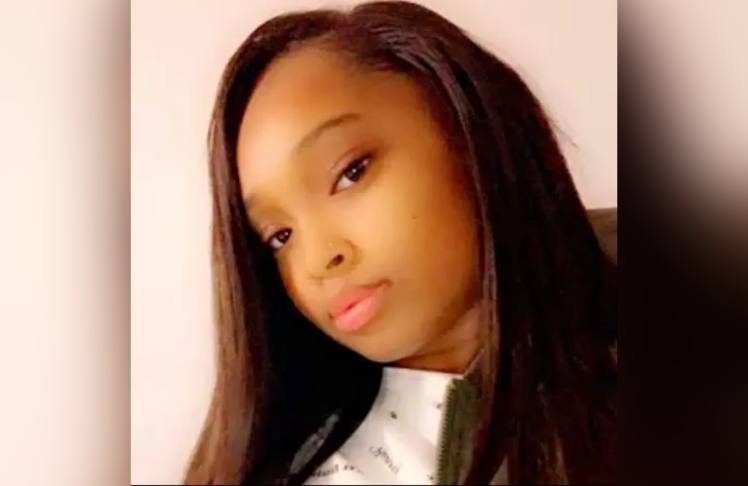
by Anissa Durham
This story is part two of a series on domestic violence that highlights the experiences of Black survivors of domestic abuse who now support and help current victims.
Chancierra Coleman had a feeling her 21-year-old little sister would be killed by her ex-partner, a worry that became true in June of this year.
“I told her several times if you’re gonna leave him alone, leave him alone because you’re playing with fire,” she says.
Coleman’s sister Mi’Ckeye Montgomery had just broken up with her ex-partner when he kidnapped their then 16-month-old daughter and Montgomery near their daughter’s DeKalb County, Georgia, daycare. He then took them to the woods behind the center, while wearing an ankle monitor, and shot Montgomery to death as she held their daughter.
This is a story of how the justice system fails Black women.
This is a story of how our community fails Black women.
And this is a story about the generational trauma domestic violence inflicts on the Black community.
Montgomery is described by her sister as a young woman who was full of life, loved to dance, was her nieces’ and nephews’ favorite aunt, and loved to laugh.
“She loved her daughter with an unexplainable and unconditional love,” Coleman says. “She was the baby to many; she was truly a sweetheart.”
The way Montogomery died isn’t an isolated incident, a report by the National Coalition Against Domestic Violence found that in 2017, there were 149 domestic violence-related fatalities in Georgia, with 70% of those deaths involving firearms. 65% of all murder suicides involve an intimate partner and 96% of domestic violence-related homicide victims are female.
On average there are 16,800 homicides annually due to intimate partner violence and in 70-80% of these cases, regardless of which partner was killed, the man physically abused the woman before the murder, according to data compiled by Shelter House Domestic and Sexual Violence Center.
Intimate partner homicides are preventable. Coleman says not only should her sister’s ex-partner be held accountable, but the systems that failed her sister should be, too. She says Montgomery’s ex-partner should have been held accountable for the physical assaults he committed against her sister, even through mandatory therapy or counseling to work through his issues — but that’s not what happened.
The justice system allows “people to slide through cracks,” Coleman says.
“Because she was a young Black female, single mother, naïve, who was so called in love, I felt like they didn’t take it seriously,” Coleman says.
How systems fail Black victims
Coleman says she doesn’t know how her sister’s ex-partner was able to be released from jail on bond or how he was able to access Montogomery while wearing an ankle monitor. But she says this wasn’t the first time he was released — on a prior occasion, he bonded out of jail after holding Montgomery and their baby at gunpoint.
“I definitely feel like they neglected and failed to do their job, to protect them and serve, first and foremost, the police department and everybody that’s involved in the judicial system as a whole,” she says. “They should be held accountable.”
Montgomery’s death has changed the family. Coleman says it was a financial burden to bury her little sister, and now they are working to get a permanent placement for her niece. Just before her sister was killed, Coleman was first on the scene at the daycare, what she didn’t know was that they were behind the daycare, and she was unable to get to them.
Even then, police placed her niece in the system, despite Coleman being there and willing to take her, she says. Although the baby is temporarily with Coleman’s grandmother, she says there are divisions in the family about who is going to raise her niece long-term. On top of that, she says the judicial system is allowing Montgomery’s ex-partner, who is incarcerated, to have “some say-so in what happens to my niece.”
“If we think about what happens when Black women report domestic violence or intimate partner violence, a lot of times they are retraumatized, they’re dismissed, they’re questioned in more of a way that feels like an interrogation,” says Jalana Harris, a psychotherapist who teaches at Columbia University’s School of Social Work.
Harris co-authored a 2021 study about the cultural scripts for Black women and how that intersects with intimate partner violence. Harris says the strong Black woman archetype can play a role in violent relationships because some women feel they want to protect their partner — and, historically, Black women have been less likely to seek help or report it.
In the Black community, there’s a tendency to have harsh responses to Black women who report violence, Harris says — because of the belief that Black women should be protecting Black men and the community at the expense of themselves.
Black women are constantly expected to be strong no matter the circumstances, should never complain and should be grateful for any sliver of kind treatment. Even when a Black woman decides to seek help, systems like the police department and welfare have historically and continuously shown a lack of support.
Something Harris says contributes to Black folks dealing with things on their own and within the community.
“If I cannot go to the police because it’s not safe for me to do so, then I’m forced to … adhere to this sort of cultural community silence around issues,” she says. “I would call this a survival pattern. This silence while stemming from a … place that kept us safe, also has this other impact of now I don’t say what’s happening in my home.”
Oftentimes with no support system to turn to, Black women are also stuck in abusive relationships because of financial means, Harris says.
A 2021 study by National Partnership for Women & Families says pay for full-time Black women in 25 states ranges from 49 to 68 cents for every dollar paid to a white man.
“So if we’re looking at this from a financial perspective, as well, and Black women earning significantly less … it also makes us think about the ways in which sometimes we feel forced to be in relationships just to survive,” she says.
Generational trauma of homicide, death
Harris says, when looking at the Black community, there’s generally a high rate of loss — especially with the COVID-19 pandemic where nearly 150,000 Black folks lost their lives. The trauma associated with constant death in the community is “sort of expected,” she says, but it leaves folks to deal with more grief.
“We live in a world that doesn’t even make space for that. So, if I’m dealing with grief and I can’t even freaking take off from work, that just creates a pile-up,” she says. “Another thing is it normalizes this idea of loss … and that we are not safe and that any moment we could just be snatched from this earth.”
This normalization Harris refers to contributes to Black folks having a decreased sense of hope, joy, and happiness, she says. Something she hears often in her practice is this idea that folks should just be happy, but it sends a message that the Black community should be in a perpetual state of survival and anything beyond shouldn’t be expected.
“We should just be lucky that our husband didn’t kill us. So why would I even expect tenderness from somebody? I’d be grateful that they just didn’t kill me last night,” she says. “It really diminishes the importance of wanting something better because it suggests that you can’t have better.”
Part of the reason Montgomery tried to make things work with her ex-partner was that she wanted a family, Coleman says. Especially after growing up seeing their mother experience domestic abuse, she says her sister wanted to give their baby a chance to grow up with both parents in the home.
“It’s just so easy for people to say ‘woulda, coulda, shoulda’ when you’re not in that position,” Coleman says about people who ask why her sister didn’t leave sooner. “You just have to have an understanding heart and open mind to at least understand the smallest bit of why people stay in those situations.”
Ten months prior to Montgomery’s death, their mother passed away in August of 2021, nine days later Coleman says her husband and brother-in-law were ambushed and killed on the same day.
“It’s done a lot of damage … it’s never going to be normal.”















